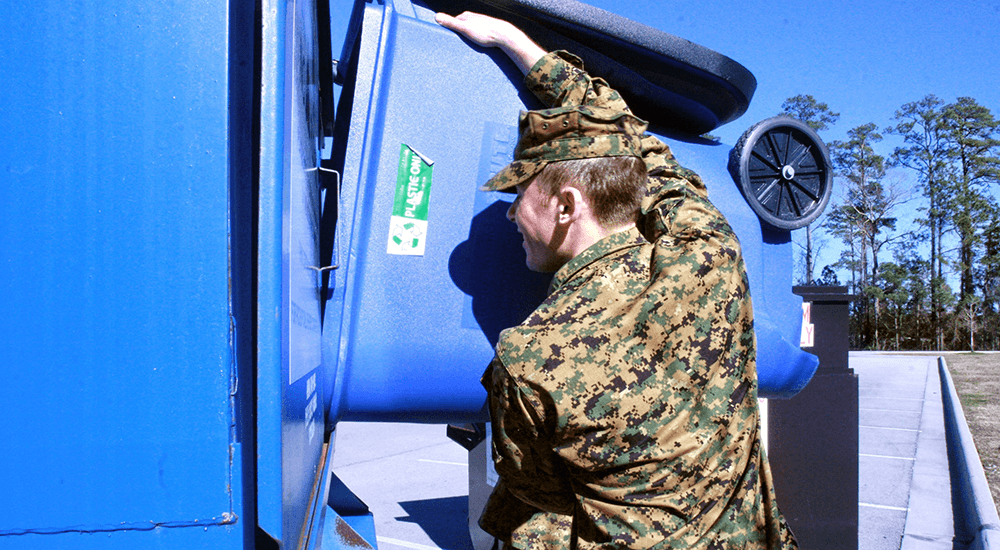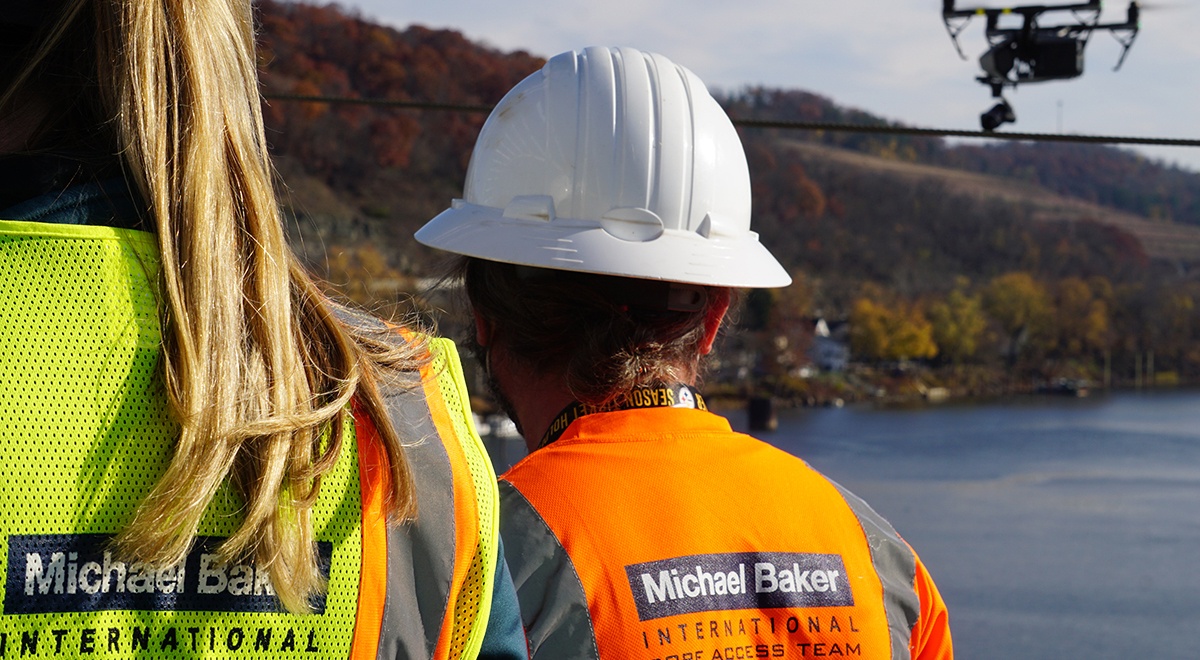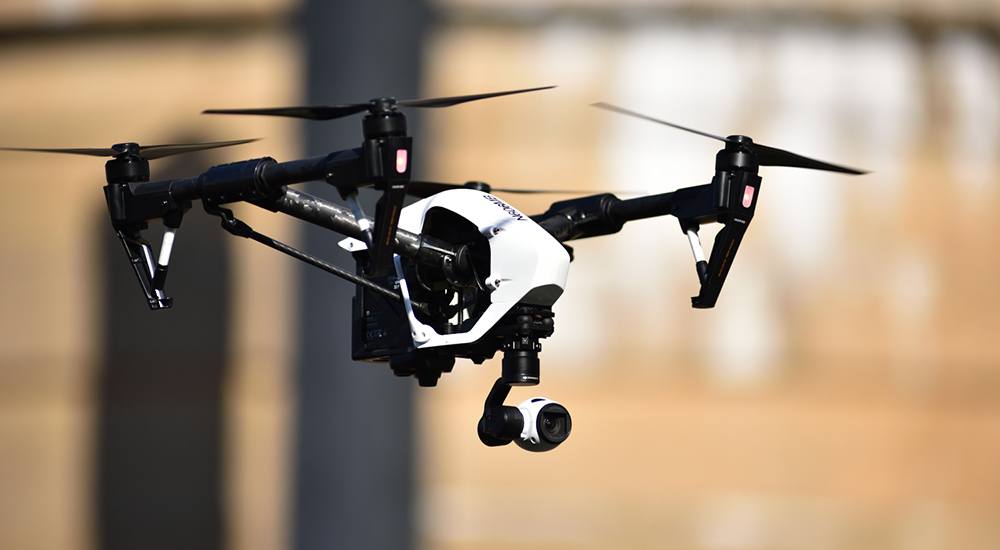Strengthening environmental awareness and compliance at Marine Corps Base Camp Lejeune
From the Fall 2018 issue of Signature
Marine Corps Base Camp Lejeune in Jacksonville, N.C., already had instituted a Strategic Sustainability Performance Plan and a Qualified Recycling Program when program managers realized they needed to do more to foster meaningful participation in these initiatives among the base’s regional population of more than 137,000 people. Driving this need for participation was a series of consecutive executive orders that define a detailed list of environmental sustainability compliance directives aimed at federal agencies. Among those orders:
- The diversion of 50 percent of non-hazardous solid waste and construction and demolition debris from landfills via recycling programs;
- Two percent annual reduction in petroleum consumption;
- Ensuring that 95 percent of all new contracts require products and services that are energy-efficient, water-efficient, bio-based, environmentally preferable, non-ozone-depleting, contain recycled content, and are non-toxic;
- Increasing the use and generation of renewable energy; and other targeted directives.
OBSTACLES ON THE PATH TO SUSTAINABILITY
Addressing many of those directives proved challenging without changing the mind-sets of people across the base. Obstacles included limited funds; limited manpower to enlist help; a lack of incentives for the rank-and-file, especially since most residents did not pay for their own electric, water and gas utility costs; a transiency among Marines and their families, as well as the commanding leadership; a host of outside contractors lacking both the knowledge of – and incentives to heed – environmental standards; and an apparent disconnect between the base’s environmental initiatives and its daily operations focused on mission readiness.
EDUCATING OUTSIDE CONTRACTORS
Construction workers and other outside contractors had no way of knowing anything about the executive orders and the base’s environmental requirements. To change that, the team helped the Environmental Management Division (EMD) develop a list of environmental standards and acceptable “best practices” to which the contractors would have to adhere going forward.
The team also updated a guidebook for outside contractors to help them better understand the compliance rules and, overall, Camp Lejeune’s environmental stewardship mission, along with ways to effectively comply.
WRITING THE BOOK ON RECYCLING
Before the outreach effort began, Camp Lejeune’s EMD had developed a number of progressive recycling initiatives under its Qualified Recycling Program (QRP). For instance, the team launched recycling efforts to identify and recycle solid-waste items, such as copy machine toner cartridges, used oil rags and batteries, that previously had been discarded in the landfill. The team continued to analyze other waste that could be diverted from the landfill, including household cooking oil, plastics and cardboard, and tested a pilot program for single-stream recycling.
Still, one of EMD’s biggest challenges was awareness and participation in its programs.
To support the base’s Strategic Sustainability Performance Plan, recycling program and environmental initiatives, a series of flyers, brochures, pocket guides, training manuals and even social media campaigns aimed at educating Marines, families and workers on base were developed.
Key among the materials was an environmental-standards guidebook for Marines titled, “Overview of Camp Lejeune Environmental Programs.” This accompanied the guidebook for outside contractors. The guidebook was designed as a go-to reference guide about the military base’s environmental goals and programs that were in place to achieve those goals.
All of those materials ultimately contributed to an increase in participation in the various recycling programs on the base and even led to related initiatives to better manage the base’s supply and use of batteries to conserve energy and reduce waste. The battery initiatives alone resulted in a savings of an estimated $500,000 in long-term procurements costs.
The team also developed an executive-overview-type performance report for base leadership with simple-to-read visuals that used the colors red, yellow and green to denote the level of compliance with the executive orders. While some leadership demonstrated greater interest than others in the environmental sustainability and recycling programs themselves, all took a keen interest in the performance reports, particularly when certain measurements would slide into the red, which signified non-compliance.
REACHING THE PARENTS THROUGH THEIR CHILDREN
The most effective awareness and outreach efforts revolved around engaging the children of those living and working on the military base. The idea was that if the team could engage the children and convince them to establish stronger environmental stewardship habits at home, those children would educate their families and get them to adopt a similar mind-set and habits. The approach, which centered around the development of large-scale, hands-on events for children, worked better than what the team had imagined.
The base’s signature event became an annual Earth Day Expo, which attracted more than 1,000 local children the first year alone. As part of the expo, held on base every April, the team developed upwards of 19 booths and stations – manned by subject-matter experts from across the base and beyond – where the children could interact and learn about the environment, recycling, energy conservation and other relevant topics that supports the EMD’s Camp Lejeune mission.
To help move the children through the maze of educational activities, the team devised a scavenger hunt requiring the children to ask questions along the way and seek answers to specific questions. Also included is an art contest leading up to the Earth Day event and prizes to garner additional participation. The result: annual attendance continues to climb, and schools in the area now are requesting that Camp Lejeune and its environmental team adapt the Earth Day Expo and related environmental activities to take on the road into the neighboring schools themselves.
Eventually, the team succeeded in engaging the Marines themselves in the environmental activities. Among the more successful initiatives: Splash For Trash, in which Marines provided kayaks and other boats to military volunteers to collect trash and clean up the shorelines and beaches.
To maintain a united front on environmental sustainability and recycling, cohesive branding, including a logo for the sustainability program, tied together all educational materials, recycling programs, annual events and even the performance reports. And it worked. Ultimately, notices of violations of directives within the executive orders driving these environmental activities dropped, and compliance across the spectrum improved.
As a result of these hands-on initiatives, the EMD saw recycling increase in family housing within a brief period and are confident this trend will continue.




